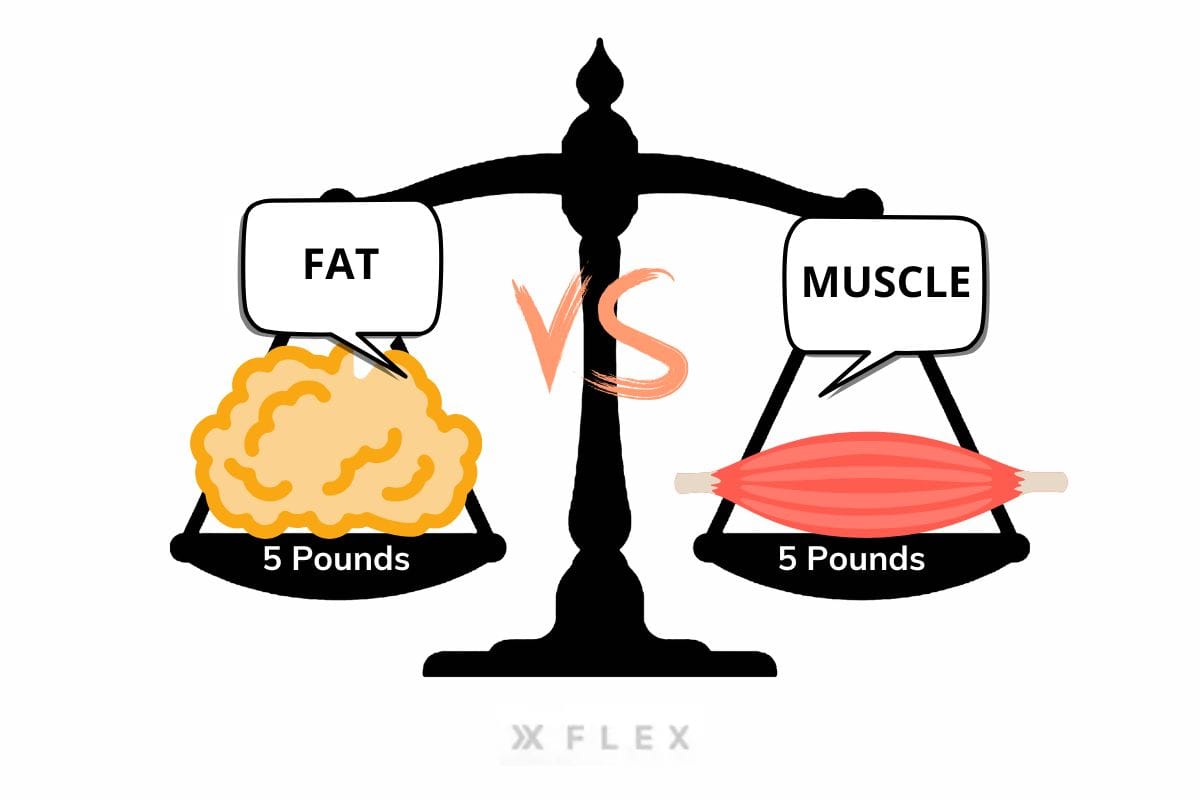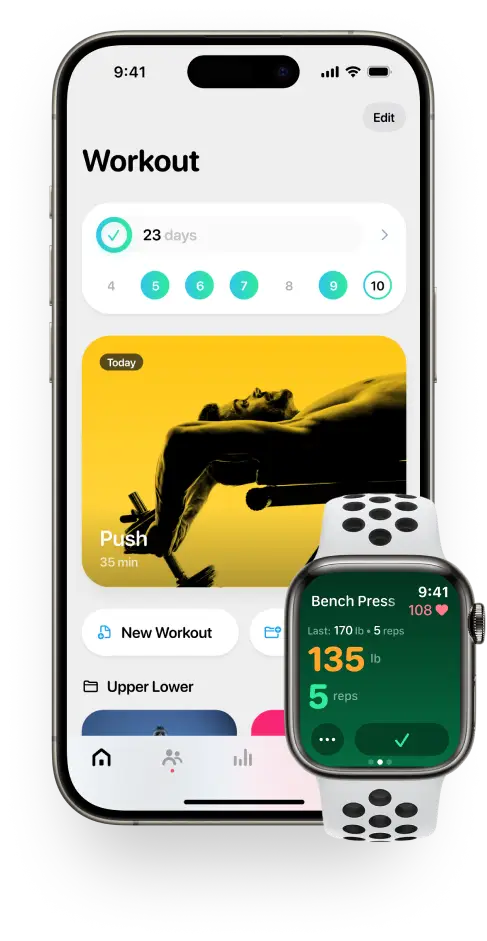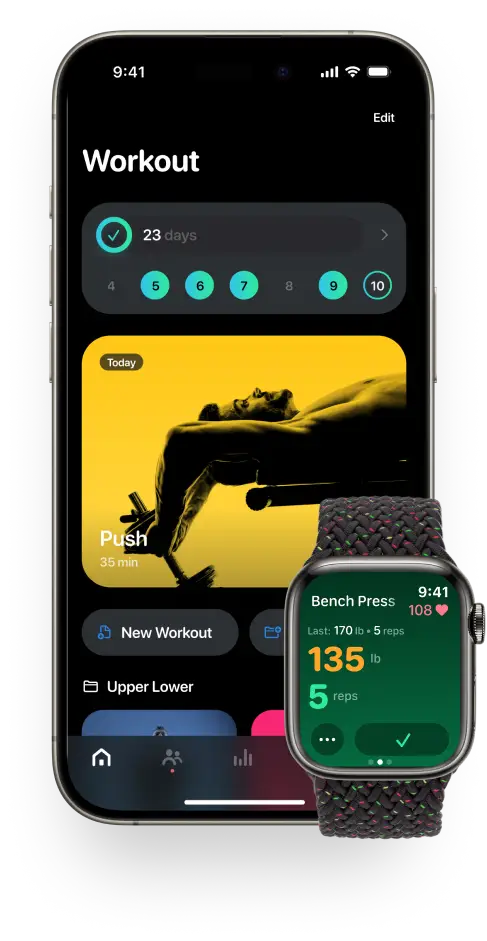5 Pounds of Fat vs. Muscle: Understanding the Key Differences
What weighs more, muscle or fat? We broke it down here. Plus, the impact of 5 pounds of muscle vs. fat on your overall health.
Does muscle weigh more than fat? Understand the difference between 5 pounds of fat vs. muscle. Plus how to recompose your body.
This is one of the major debates constantly circulating around the fitness community. Five pounds is five pounds, regardless of what it’s made of.
Having more muscle or more fat can make a visually noticeable difference in the way you look. Excess fat, especially, can have a significant negative impact on the health of your organs.
Let’s look at how more muscle vs. more fat influences your body’s physical composition and health indicators.
5 Pounds of Muscle vs. Fat: Which is Bigger?
Five pounds of muscle and five pounds of fat ultimately weigh just that — 5 pounds!
That being said, muscle and fat have completely different densities. Muscle tissue weighs about 1.06 kg/L, whereas fat is about 0.92 kg/L. If you took a five-pound chunk of muscle and placed it next to a five-pound chunk of fat, they would be different sizes.

5 pounds of muscle would occupy about 87% of the space that 5 pounds of fat would occupy. Accordingly, muscle is almost 15-16% denser than fat.
The muscle would be about 7/8ths the size of the fat.
Muscle looks more compact. Muscular people have completely different body composition to those with more fat on their bodies.
Bodybuilders, special forces workers and other highly-trained individuals, for instance, are often considered medically “obese.” However, observing the muscle mass differences of elite lifters, you may not guess this to look at them.
How Do I Build Muscle and Get Rid of Fat?
Can you lose fat and build muscle at the same time?
Many people who are eager to lose fat or lose weight often end up losing muscle on their fitness journeys as well.
To lose fat, you need to be in a calorie deficit. This means you burn more calories than you take in.
To put on muscle requires a calorie surplus. Here, you consume more calories than you burn to increase the size of your muscles.
These two ideas directly contradict each other.
Some training programs prioritize both muscle gain and fat loss.
Eating a high-protein diet while focusing on strength training in the gym will help you to bulk up those muscles. Maintaining a calorie deficit in your diet helps you lose fat. You may also want to look into fat burners to accelerate your fat loss. What happens if you take fat burners without working out?
Probably not a lot. You'll still need to compound any fat burning supplements with smaller food portions and proper workouts to support weight loss. Otherwise, you won't get the overall calorie deficit you need to lose fat.
Body Recomposition vs. Weight Loss
Fat loss and weight loss are not the same.
Although they often go hand in hand, losing fat and building lean muscle may cause you to gain weight. Remember the diagram we saw above? A more muscular body may look physically smaller, more defined, and you may drop a clothing size or two.
Being physically smaller does not necessarily mean you’ll drop pounds once you lose the fat.
The goal of recomposing your body is to optimize your lean muscle. Reducing as much fat as possible can give you a leaner physique.
Body recomposing focuses on the relationship between your amount of lean muscle and the amount of body fat. Many of us have heard the term “skinny fat,” which applies to a thin person with a high body fat percentage. Although they may appear smaller or wear a small clothing size, the excess fat on their bodies can still contribute to health issues.
You might gain weight on a scale when you start to recompose your body. But your body will look completely different with a high amount of lean muscle vs. high body fat.
Body Recomposition Plan
A body recomposition program can be harder to track than a traditional weight loss regimen.
Since you’re not going for direct weight loss results, you’ll have to rely on other metrics to test your progress. Here are a few tips for monitoring your success when you decide to go through body recomposition:
Take Your Measurements
Rather than weighing yourself on a scale, use a measuring tape. Measure the distance around your hips, waist, arms, and legs to see where you are losing or gaining inches.
Remember, lean muscle should reduce the size of your body in general.
The number on the scale or your body mass index (BMI) aren't always accurate indicators of health. To make sure you're gaining muscle and losing fat, measurements are a good idea. This way, you can see how your diet and exercise routine is helping your lose body fat and extra inches.
Especially in areas like around the abdominal region, this can be a key health indicator. Should you work out your abs with belly fat? Excess belly fat is one of the leading causes of heart disease. Both subcutaneous fat and visceral belly fat can be dangerous for you. You can use these metrics to directly track your health outcomes.
Eat a High-Protein Diet
Protein is one of the best things you can put in your body to look and feel better. In fact, for active people, a high-protein diet along with heavy resistance training can improve body composition.
This was even true when eating at a caloric surplus. Although calories in and calories out relate to weight loss, the quality of the calories can impact how you look and feel.
Making sure to get an adequate protein intake along with healthy fats and complex carbs is one of the best ways to ensure your body can build lean muscle.
Work Out For Body Recomposition
Focus your workouts on burning more body fat and training muscular strength at the same time.
Try out things like:
- HIIT: High-intensity interval training or HIIT workouts may have a positive effect on abdominal fat loss. It also lowers insulin resistance so that the body can use blood sugar for energy.
- Compound exercises: A compound exercise is any move that works for multiple muscle groups at the same time. For example, a squat works your glutes, hamstrings, and calves. Weightlifting moves that have a cardiovascular or dynamic component and are compound are some of the best for burning fat while you burn muscle.
On top of your regular weight training, these moves can help you prevent weight gain from fat by burning a higher number of calories.
Big Picture
Five pounds of muscle weighs the same amount as five pounds of fat: five pounds.
That being said, muscle is generally much healthier to have in high concentrations in your body.
Excessive fat, particularly in the abdominal area, relates to heart disease and can cause significant health problems.
If you’ve mastered basic weight maintenance and workouts, you may want to experiment with improving your body composition. Want to get the physique of a Greek god? Try out some hip flexor stretches to improve your squats? Or maybe working out to get a heart-shaped ass is more your style. Check out our articles to learn more about how you can achieve these fitness goals.
Regardless, consult with a doctor or nutritionist if you’re making major changes to your health and fitness regimen.
Aiming to reduce your fat but not your workout quality? Flex AI provides a complete workout platform for learning exercises, tracking fitness progress, and storing personal records.
Creating personalized fitness plans and sharing exercises with friends in your fitness community is now easier than ever. Start for free by using the Flex fitness app.
Related articles
What Happens if You Take Fat Burners Without Working Out?


Get fit with Flex
Build muscle & lose weight fast for free.
Available on iPhone + Apple Watch



